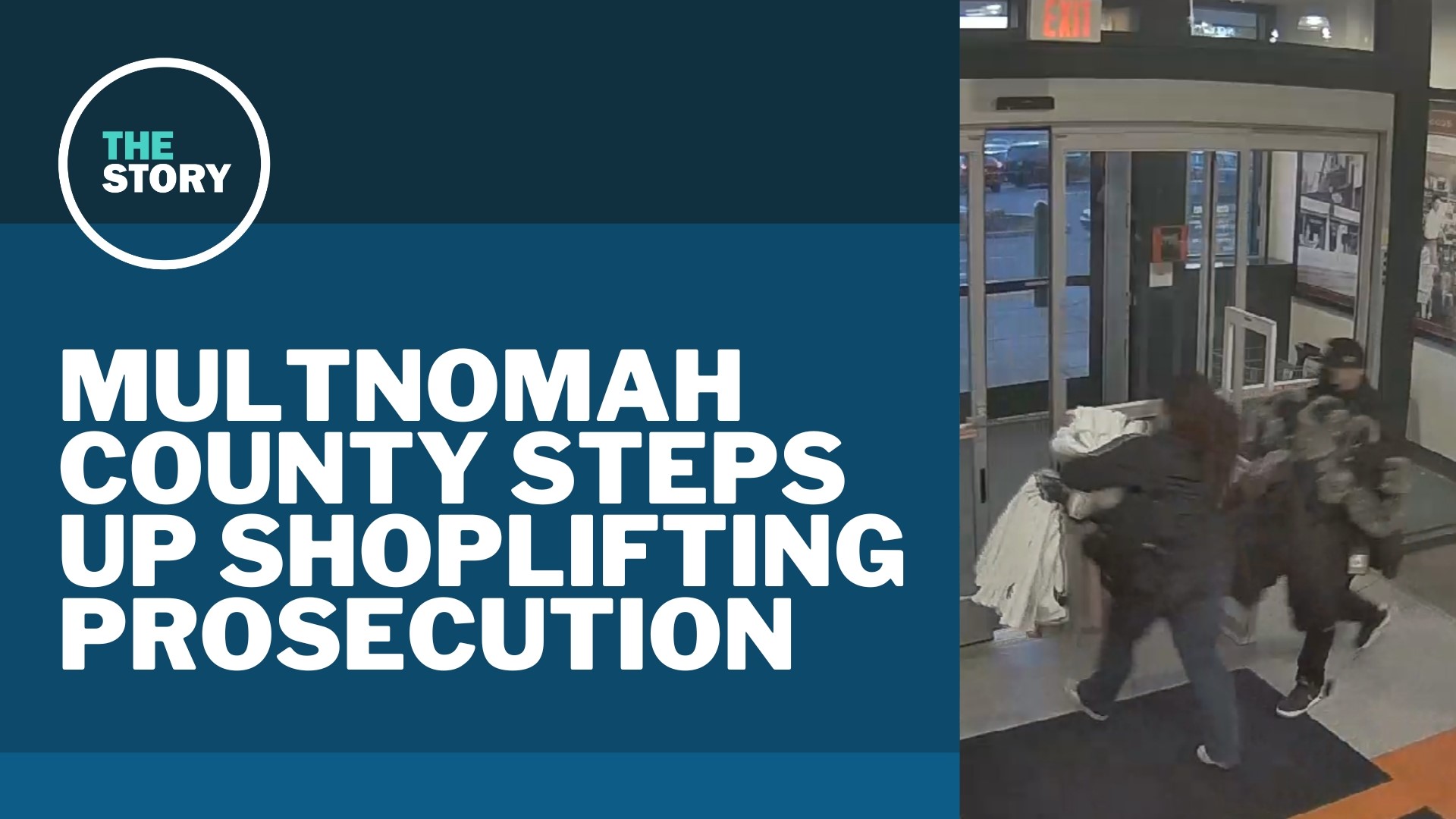PORTLAND, Oregon — The Multnomah County District Attorney’s Office is prosecuting a higher rate of shoplifting cases than it did one year ago, according to newly released data. The improved numbers stem from several factors including changes in how theft cases are reported, stronger police relationships with big-box retailers and better follow-up to ensure that critical evidence such as surveillance videos or photos are shared with prosecutors.
Through October, the Multnomah County DA’s office has prosecuted 82% of misdemeanor theft cases, meaning thefts involving less than $1,000 in goods. That’s compared to a 50% prosecution rate in 2022 for that category, which represents most shoplifting cases in Portland.
The data indicates Multnomah County is now on par with prosecutors in other counties, such as Washington and Clackamas. Through October, the Washington County DA’s office prosecuted 94% of all Theft 2 and Theft 3 cases referred by police, while Clackamas County prosecuted 82% of its misdemeanor theft cases.
Last year, a KGW investigation found Multnomah County DA Mike Schmidt’s office had dismissed roughly half of all shoplifting cases at a time when Portland business owners complained retail crime had risen to new levels and shoplifting had become more frequent and brazen.
At the time, Schmidt said cases his office dismissed were rejected because prosecutors didn’t have the evidence they needed. The situation was further complicated by the fact that Portland police lacked the resources to follow up on many theft investigations.
“We’re taking that extra proactive step now to make sure that we get everything we need to file the charge. That’s the big change,” Schmidt said.
Over the past year, Portland police and the Multnomah County DA’s office have worked to improve relationships with retailers, especially big-box retailers commonly targeted by thieves. The detective division assigned an officer to work directly with store security and loss prevention to make sure they know what is needed in a written report to help build a better case.
“We’ve been able to educate retailers,” said Sgt. Craig Andersen with the Portland Police Bureau. “They understand the elements of the crime that they need to articulate to us.”
The DA’s office has also become more proactive in reaching out to retailers to obtain necessary evidence, such as surveillance videos or photos.
“Our deputy district attorneys are picking up the phone and saying, ‘Hey, are we going to be able to get the video from you? Is that coming in?” Schmidt said.
A property crimes detective also came up with an idea to make reporting easier. Previously, if a shoplifter was a known suspect, retailers had to call the police non-emergency number and wait for an officer to arrive and make a report. The process often left retailers frustrated. Now, retailers can submit reports online through the city’s website.
Over the past year, Portland Police officers at East Precinct along with the Neighborhood Response Team have tackled the problem by conducting retail theft missions resulting in dozens of arrests. Highlights of their missions are often posted on social media.
Some national retailers suggest this kind of targeted enforcement has led to reduced shoplifting, particularly in northeast Portland.
The Walgreens store at Northeast 122nd Avenue and Glisan claims that shrink fell from $480,000 in the 12-month period starting in February 2021 down to $210,000 in the 12-month period starting in February 2022, according to a company email obtained by KGW. Shrink is a term that encompasses inventory losses due to theft, operational or inventory mistakes and systemic errors.
A downtown retailer, who asked not to be identified, said he appreciates the emphasis on big-box retailers, but shoplifting remains a persistent problem citywide. Smaller stores don’t have the resources to employ private security and there is less margin to absorb losses due to theft.
It is difficult to measure if the problem is rising or falling, because shoplifting often goes unreported. However, the National Retail Federation trade group has recently been criticized for using inaccurate organized retail crime figures that helped amplify claims that the U.S. was experiencing a nationwide surge in shoplifting.
Portland Police data suggests there has been a 45% increase in shoplifting cases citywide in 2023 compared to last year. But police and retailers both warn that those numbers are imprecise.
“I would argue that it’s underreported because some of these, especially lower-level ones — say a $20 theft — a lot of times retailers say this isn’t worth our time to even report it,” Anderson said.
In July, Schmidt and other local leaders announced a new Retail Theft Task Force, which included a dedicated prosecutor.
“Having a deputy district attorney on the scene at some of these missions means that we can give legal advice right there as police officers are making their cases,” Schmidt said.
In January 2024, new laws will take effect in Oregon targeting retail theft. The state legislature passed several bills that increase penalties and step-up enforcement. Individual cases can now be added together if thefts were committed against the same or multiple victims in a one-year period.

